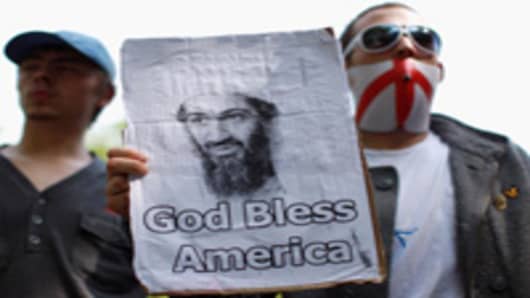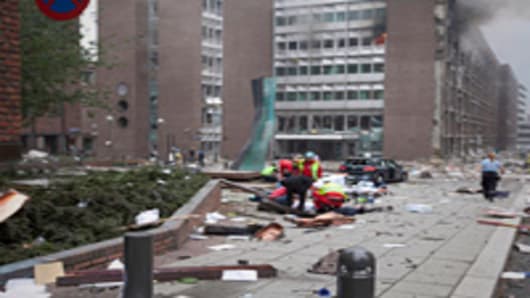The increasing acceptance of Islamophobia and anti-immigration rhetoric in the mainstream of European political discourse has created a space for a resurgent and self-confident far-right to become a credible threat to security and society.
On February 4, 2011, several thousand supporters of the English Defence League (EDL), a far-right group which purports to oppose "Islamic Extremism in the UK", gathered in the town of Luton, some 30 miles north of London. As well as coach loads of EDL demonstrators travelling in from across England, the town reportedly played host to activists from Europe – including established groups from Denmark, France and Germany, and newer ones, from Norway, Sweden and the Netherlands.
The EDL has denied any links with Anders Breivik, who confessed on the weekend to the attacks that killed 92 people in Norway.
2010 was a strong year for the far-right in Europe.
In June, Geert Wilders, a notorious anti-Islam campaigner in the Netherlands, won 24 seats in the Dutch parliament.
In September the Swedish far-right party, the Sweden Democrats, won a shock 5.7 percent of the vote in general elections, gaining 20 seats in parliament.
That October, German Chancellor Angela Merkel said in a speech to a conference of junior Christian Democrats that the country's "multikulti", or multiculturalism, had "utterly failed".
In France, threatened by the increasing popularity of the far-right Front National, Nicolas Sarkozy has led his UWP party to the right, even moving to deport Roma from their camps in the country and pushing through bans on the burqa, the traditional head covering worn by some conservative Muslim women.
Some analysts and politicians have questioned whether the rise of the far-right is the consequence of concessions made by mainstream parties for political expedience in the face of economic austerity.
The unpopularity of mainstream politicians after an economic downturn that has driven public spending cuts and the specter of real declines in living standards and employment has seen anti-immigrant rhetoric gain currency in Europe. In defiance of the Schengen agreement on open borders, the Danish government reintroduced border controls in May after coming under pressure from the populist right wing Danish People's Party (DPP).
The ability of the DPP, which is roughly allied with the government, to force such a measure seems to illustrate how center-right governments have had to court previously unpalatable fringe constituencies in order to push their own agendas, finding themselves under pressure to acknowledge anti-immigration views as politically legitimate.
New Far-Right
The far-right itself has morphed from its historic links with Neo-Nazism and anti-Semitism towards an ideology that opposes multiculturalism and feeds off the flawed, but popular, association between European Islam and the militant "Islamism" of Al Qaeda.
Far-right campaign group "Stop the Islamization of Europe" now has chapters in 11 countries.
"We've seen a move away from traditional rightwing extremist groups that are living in an idealized Nazi-era past to something that is more focused on contemporary issues, and multiculturalism is very much at the forefront," Nigel Inkster, a former director for operations and intelligence at the UK's Secret Intelligence Service and now director of transnational threats and political risk at the International Institute for Strategic Studies, told CNBC.com.
With bans on full-face veils coming into force in France and Belgium and a moratorium on the construction of minarets being enacted in Switzerland, Islamophobia has entered the mainstream of European politics. Those individuals previously operating far on the fringe of the political spectrum have been given succor - if not a kind of legitimacy - by the steady drumbeat of public hysteria over immigration and by the demonization of Muslim populations in the media.
Every far-right voter is not, by association, a potential attacker. But the climate has probably created a more conducive environment for violent extremists, analysts say.
"Does this create the political space in which people like Breihvik can operate? I think to an extent it does," David Lea, European analyst at political risk consultancy Control Risks, told CNBC.com. "I think it shifts the center of the political discourse in a country sufficiently to create the room for outliers, who can then attract support on the basis of what they write on the internet," he said.
"It's very difficult to make that claim that the wider climate has created this incident, but the simple reality is that this attacker was operating in a subculture and a climate that has received growing support in recent years, has been more active and has been expanding," Dr Matthew Goodwin, an expert on the far right and associate fellow at Chatham House, told CNBC.com.
"I think if we really want to get to grips with some of the underlying motivations that are in his manifesto, and if we want to understand why European voters are concerned with those issues then we need to have this bigger discussion about context and the context in which this took place. This wasn't a Norwegian exception, this wasn't a Scandinavian exception, this was something that I think represents a threat that is broader in scope," Goodwin said.
The new European far right "is not simply a Neo-Nazi, disorganized, crude organization. This is a movement that has been building international networks and trying to change its ideological appeals to try to reach out to sections of European society, and I think the mainstream parties have struggled to keep pace with that change," Goodwin added.
Media Frenzy
The media coverage of the aftermath of the Oslo bombing typified the knee-jerk assumption that any large-scale attacks must be the work of Al Qaeda or affiliated groups.
Sky News rapidly began to roll out analysis looking for actions that might justify an Islamic extremist attack on Norway – from the country's involvement in Afghanistan and Libya, to tenuous links to cartoons of the Prophet Mohammed published in Denmark.
The largest UK tabloid, the Sun, counter to the emerging evidence, apparently tried to fit their coverage to the extant narrative, splashing across its Saturday front page a report on an "'Al-Qaeda' Massacre" in Norway, saying that the Norwegian ethnicity of the alleged perpetrator suggested that he was a local convert.
This kind of irresponsible speculation serves to normalize the idea of the religion as a whole, rather than specific terrorist groups, as a threat to Western society - as does the publication in respected news outlets, such as the Wall Street Journal,of commentary saying that Breivik's concerns were 'legitimate'.
In a nod to those in the media he felt reflected his views; Breivik repeatedly quoted the British anti-immigration columnists Melanie Phillips and Jeremy Clarkson in his online postings.
Europe's Far Right
The failure to address the founding myths of anti-Islam and other far-right groups and confront them on their increasingly overt racism and intolerance has encouraged them to the point where they are both a frightening political force and a credible security threat.
To say that this rise was "creeping" and underground is untrue. The European far-right has been far from shy. Online forums, such as Stormfront, founded in the US by former Ku Klux Klan head Don Black, attract tens of thousands of users around the world. The site has been removed from search indexes in France and Germany under laws which prevent the promotion of holocaust denial.
Breivik is widely believed to have been the author of a document, "2083: A European Declaration of Independence", a vitriolic manifesto of hate directed at Muslims, "cultural Marxists" and supporters of multiculturalism, which was uploaded to Stormfront – whose slogan is "white pride worldwide" – shortly before the attacks in Norway.
The document, eerily dotted with emoticons and ideologies borrowed from Ted Kaczynski, the Unabomber, makes repeated reference to Crusades-era iconography, including that of the Knights Templar, a group that appears in much conspiracy theory literature and historical mystery fiction. The date, 2083, is the 400th anniversary of the siege of Vienna, the northernmost incursion of an Ottoman army into Europe.
It, like so many other such documents posted online, looks like the work of a teenage fantasist more wrapped up in violent computer games and TV series than engaged in the real world. That Breivik, previously unknown to the police, was able to acquire materiel and enact those fantasies changes the tenor of other posts on far-right bulletin boards.
"Many of the online postings are probably done by a junior accountant in his bedroom in Hounslow, it is very difficult to tell the genuine threat from the fantasist," Control Risks' Lea said.
The online presence of supposed Islamic extremists is closely monitored, and more attention may now be placed on far-right groups' activities on the internet.
"It may need to happen," IISS' Inkster said. However, he added, "I think the difficulty remains that in large measure what we're talking about here is the expression of political views, rather than the commission of violent acts. We're going to go through all the difficulties of gauging when talking stops and action starts, and when people's entitlement to express their views freely comes to an end."
Those discussions have been had once before post-September 11. The question now is whether the July 22 attacks - on a per capita basis among the greatest loss of life suffered by a nation in any terrorist attack worldwide – will elicit a similar crackdown on the militant far right.
Breivik's hearing is likely to be held behind closed doors, so as to avoid giving him a platform for his ideas. However, countering the proliferation of similar views and similar threats is a more difficult prospect.
"This is a fringe movement, but the potential for violent attacks is within a broader array of groups," Goodwin said. "I think there is a risk that we could look at this person as an isolated, irrational loner, and I don't think necessarily that's the most accurate description."
In all likelihood, this is a battle that will have to be fought in the political mainstream, and consequently it will require political courage to reverse the inroads made by the extreme right into European politics and to reject the convenient narrative of the threat of Islam that has developed since 2001 that has fed them on their rise. A failure to do so could strengthen a far more pervasive, unpredictable and destructive enemy within European societies.



